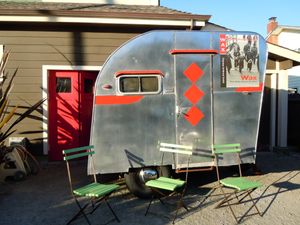The Genesis of the Tin Can Camper Book Tour

My friend Rube baits me. He's one of the most creative people I know, but he enjoys launching my pursuit of his ideas more than acting on them.
About ten years ago, I was accumulating found construction materials for my beach shack. I was collecting granite countertop scraps when Rube read about a bowling alley that was being deconstructed in Oakland. Rube decided that an old bowling lane would be the perfect material for unique countertops – especially if you could preserve the lane markings in the final finish. Of course I loved the idea. "It would be very cool," I agreed.
I imagine he was grinning as he hung up the phone, knowing I spend hours trying to track down an architectural salvage company with a bowling alley in the inventory. He probably thought I'd get into a bidding war for the material. I did eventually find it. But the wood had been piled outdoors, and a late season storm had ruined it.
I'll never learn. Or maybe I don't want to. I think often of Rube's idea to build a straw bale Italian villa. You've got to admit, it's a great idea. Great ideas aren't always practical.
In early March, Rube called me to tell me his in-laws Elly and Ernie, inMinden, Nevada, had an old travel trailer that a renter had left behind. He said they would give it to me. I'd been toying with the idea of a camping book tour – my characters lived in an Airstream during the war – and here was an offer of a free camper. The details were vague, but I hadn't seen Elly and Ernie in more than a year, and a drive over the Sierra seemed like a fine Sunday activity. Maybe it was meant to be.
Long story short: it wasn't. Rube had misjudged the size of the trailer by 50%; there was no way my Ranger would pull it. And among the many things it needed, it needed tires – which is probably why it was left behind. But the die was cast and I was now convinced that I needed a vintage camper for my book tour.
